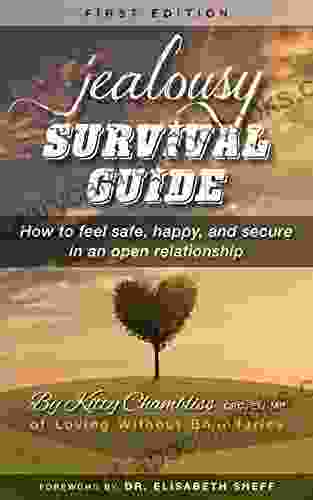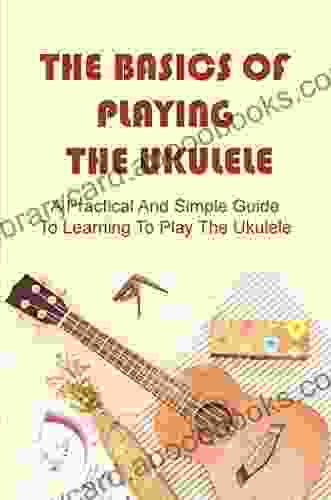How To Feel Safe, Happy, and Secure in an Open Relationship

4.4 out of 5
| Language | : | English |
| File size | : | 3072 KB |
| Text-to-Speech | : | Enabled |
| Screen Reader | : | Supported |
| Enhanced typesetting | : | Enabled |
| Word Wise | : | Enabled |
| Print length | : | 106 pages |
| Lending | : | Enabled |
In a world where traditional relationship models are increasingly being questioned, open relationships have emerged as a growing and viable alternative. Open relationships challenge the societal norm of monogamy and allow partners to explore other romantic and/or sexual connections outside the primary partnership.
While open relationships can offer immense benefits such as increased freedom, intimacy, and personal growth, they also come with unique challenges. One of the most significant challenges is creating and maintaining a sense of safety, happiness, and security within the relationship.
This comprehensive guide will delve into the intricacies of open relationships, providing practical strategies and insights to help you navigate the complexities of non-monogamy and cultivate a fulfilling, happy, and secure connection with your partner(s).
Chapter 1: Understanding the Basics of Open Relationships
In this chapter, we will explore the fundamental concepts of open relationships, including different types of non-monogamy, the motivations behind choosing an open relationship, and the potential benefits and challenges involved.
Types of Open Relationships
- Polyamory: Involves having multiple loving and committed relationships simultaneously, with the full knowledge and consent of all partners.
- Swinging: A form of non-monogamy where partners engage in sexual activities with other couples, typically for recreational purposes.
- Ethical Non-Monogamy (ENM): A broad term encompassing any type of non-monogamous relationship that is based on principles of honesty, transparency, and consent.
Motivations for Choosing Open Relationships
- Desire for greater freedom and independence
- Belief that monogamy stifles personal growth and sexual fulfillment
- Wanting to explore different types of relationships and connections
- Religious or spiritual beliefs that support non-monogamy
Benefits and Challenges of Open Relationships
Benefits:
- Increased sexual freedom and exploration
- Enhanced intimacy and communication within the primary relationship
- Personal growth and self-discovery opportunities
- Reduced jealousy and possessiveness
Challenges:
- Managing jealousy and insecurity
- Navigating societal stigma and disapproval
- Balancing the needs of multiple partners
- Maintaining open and honest communication
Chapter 2: Building a Solid Foundation for an Open Relationship
Establishing a strong foundation is crucial for the success of any open relationship. In this chapter, we will discuss the essential elements of a healthy and secure open relationship, including communication, trust, and boundaries.
Communication: The Cornerstone of Open Relationships
Open and honest communication is the lifeblood of any open relationship. Partners need to be able to express their needs, desires, and boundaries clearly and respectfully.
- Regular Check-Ins: Schedule regular time to talk about your relationship, including your feelings, needs, and concerns.
- Transparency: Be open and honest about your activities and interactions with others outside the relationship.
- Active Listening: Practice active listening by paying full attention to what your partner is saying and trying to understand their perspective.
Trust: The Bedrock of Security
Trust is essential for any relationship, but it is particularly important in open relationships. Partners need to trust each other to be honest, respectful, and supportive of each other's choices.
- Keep Your Word: Follow through on your commitments and promises to build trust.
- Be Respectful: Treat your partner and their other relationships with respect and consideration.
- Overcome Jealousy: Work together to overcome jealousy by addressing the underlying causes.
Boundaries: Setting Limits for Safety and Comfort
Boundaries are essential for maintaining a sense of safety and comfort in an open relationship. They define the limits of what is acceptable and unacceptable behavior.
- Establish Clear Boundaries: Discuss and agree on boundaries regarding sexual activities, emotional involvement, and time spent with others.
- Respect Each Other's Boundaries: Adhere to the boundaries set by your partner and communicate any changes in your needs.
- Re-Evaluate Boundaries: Boundaries may need to be adjusted over time as the relationship evolves.
Chapter 3: Navigating Jealousy and Insecurity
Jealousy and insecurity are common challenges in open relationships. In this chapter, we will explore the causes of jealousy, strategies for managing it, and techniques for building self-confidence and security.
Causes of Jealousy
- Fear of Losing Your Partner: The fear of losing your partner to someone else can trigger jealousy.
- Low Self-Esteem: Feeling insecure about yourself can make you more susceptible to jealousy.
- Past Experiences: Negative experiences in previous relationships can contribute to jealousy.
Strategies for Managing Jealousy
- Identify Your Triggers: Understand what situations or behaviors make you feel jealous.
- Communicate Your Feelings: Talk to your partner about your jealousy and try to understand their perspective.
- Challenge Negative Thoughts: Replace irrational thoughts with rational ones.
Building Self-Confidence and Security
- Focus on Your Own Growth: Engage in activities that enhance your self-confidence and personal growth.
- Surround Yourself with Supportive People: Spend time with friends and family who believe in you.
- Practice Self-Care: Prioritize your own well-being through activities such as exercise, meditation, or pursuing hobbies.
Chapter 4: Ethical Considerations and Societal Challenges
Open relationships can raise ethical considerations and face societal challenges. In this chapter, we will discuss the ethical principles that should guide open relationships and provide strategies for navigating societal disapproval.
Ethical Principles for Open Relationships
- Honesty and Transparency: Be open and honest with your partners and others about your relationship status.
- Informed Consent: Ensure that all partners fully understand and consent to the terms of the open relationship.
- Respect for Boundaries: Adhere to the boundaries set by your partners and respect their choices.
Navigating Societal Challenges
- Education and Awareness: Educate yourself and others about open relationships to dispel stereotypes and promote understanding.
- Find Support Groups: Connect with other people in open relationships to share experiences and provide support.
- Set Boundaries with Judgmental People: Limit interactions with people who are judgmental or disapproving of your relationship.
Chapter 5: Maintaining a Healthy and Fulfilling Open Relationship
Maintaining a healthy and fulfilling open relationship requires ongoing effort and commitment. In this chapter, we will provide practical tips for nurturing your connection, managing conflicts, and ensuring the long-term success of your open relationship.
Nurturing Your Connection
- Spend Quality Time Together: Schedule regular date nights and activities to strengthen your bond.
- Appreciation and Gratitude: Express your appreciation for your partner and the unique aspects of your relationship.
- Shared Values and Goals: Ensure that you share fundamental values and have compatible long-term goals.
Managing Conflicts
- Active Listening: Practice active listening to understand your partner's perspective and resolve conflicts effectively.
- Compromise and Negotiation: Be willing to
4.4 out of 5
| Language | : | English |
| File size | : | 3072 KB |
| Text-to-Speech | : | Enabled |
| Screen Reader | : | Supported |
| Enhanced typesetting | : | Enabled |
| Word Wise | : | Enabled |
| Print length | : | 106 pages |
| Lending | : | Enabled |
Do you want to contribute by writing guest posts on this blog?
Please contact us and send us a resume of previous articles that you have written.
 Book
Book Novel
Novel Page
Page Chapter
Chapter Text
Text Story
Story Genre
Genre Reader
Reader Library
Library Paperback
Paperback E-book
E-book Magazine
Magazine Newspaper
Newspaper Paragraph
Paragraph Sentence
Sentence Bookmark
Bookmark Shelf
Shelf Glossary
Glossary Bibliography
Bibliography Foreword
Foreword Preface
Preface Synopsis
Synopsis Annotation
Annotation Footnote
Footnote Manuscript
Manuscript Scroll
Scroll Codex
Codex Tome
Tome Bestseller
Bestseller Classics
Classics Library card
Library card Narrative
Narrative Biography
Biography Autobiography
Autobiography Memoir
Memoir Reference
Reference Encyclopedia
Encyclopedia Robert D Behn
Robert D Behn Amanda Hodges
Amanda Hodges Fred Mcglade
Fred Mcglade Anatol Lieven
Anatol Lieven Mario Escobar
Mario Escobar Richard D Smith
Richard D Smith Jiagu Xu
Jiagu Xu Amy Conley Wright
Amy Conley Wright Hunt Janin
Hunt Janin C K Gunsalus
C K Gunsalus Amy Adams
Amy Adams Piano Exercises
Piano Exercises Amor Towles
Amor Towles Mary Ellen Snodgrass
Mary Ellen Snodgrass Jordyn Madison
Jordyn Madison Diana Kanecki
Diana Kanecki Amy Rasmussen
Amy Rasmussen Anneliese Dodds
Anneliese Dodds David Allen Bergin
David Allen Bergin Ton Viet Ta
Ton Viet Ta
Light bulbAdvertise smarter! Our strategic ad space ensures maximum exposure. Reserve your spot today!

 Anthony WellsUnleash Your Potential: Discover the Secrets of Success in "00 04 39 Int June...
Anthony WellsUnleash Your Potential: Discover the Secrets of Success in "00 04 39 Int June...
 Elliott CarterMake Crochet Garden: The Ultimate Guide to Crocheting Flowers, Plants, and...
Elliott CarterMake Crochet Garden: The Ultimate Guide to Crocheting Flowers, Plants, and...
 Blake KennedyThe Other Classical Musics: Unveiling the Hidden Treasures of Global Musical...
Blake KennedyThe Other Classical Musics: Unveiling the Hidden Treasures of Global Musical... Aron CoxFollow ·13.6k
Aron CoxFollow ·13.6k Joshua ReedFollow ·7.1k
Joshua ReedFollow ·7.1k William WordsworthFollow ·10.8k
William WordsworthFollow ·10.8k Peter CarterFollow ·2.8k
Peter CarterFollow ·2.8k Arthur MasonFollow ·8.4k
Arthur MasonFollow ·8.4k August HayesFollow ·11k
August HayesFollow ·11k Gage HayesFollow ·7.1k
Gage HayesFollow ·7.1k Orson Scott CardFollow ·19.4k
Orson Scott CardFollow ·19.4k

 Roald Dahl
Roald DahlImmerse Yourself in a Mesmerizing Tapestry of Creativity:...
Prepare to be captivated by "Spectra," an...

 Clarence Brooks
Clarence BrooksUnleash Your Inner Taylor with Red Piano Vocal Guitar:...
Embrace the Red Era...

 Jeffrey Hayes
Jeffrey HayesUnlock Your Child's Academic Potential: A Comprehensive...
In today's rapidly changing...

 William Golding
William GoldingBrave Elizabeth: A Captivating Tale of Resilience and...
Immerse Yourself in a Riveting Historical...

 Curtis Stewart
Curtis StewartUnveiling the Heartfelt Melodies of Taylor Swift: A...
Step into the enchanting world of Taylor...
4.4 out of 5
| Language | : | English |
| File size | : | 3072 KB |
| Text-to-Speech | : | Enabled |
| Screen Reader | : | Supported |
| Enhanced typesetting | : | Enabled |
| Word Wise | : | Enabled |
| Print length | : | 106 pages |
| Lending | : | Enabled |








